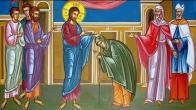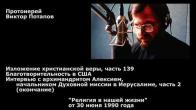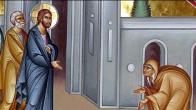2025.06.24. The Gospel of John. Discussions with Metropolitan Jonah (Paffhausen). Part 18
2025.06.24. The Gospel of John. Discussions with Metropolitan Jonah (Paffhausen). Part 18
Subscribe: https://youtube.com/StJohnDC?sub_confirmation=1
The Gospel of John, Part 18
Chapter 14
Talk by Metropolitan Jonah (Paffhausen)
November 4, 2025
Description:
Metropolitan Jonah discusses the Gospel of John chapter 14. Topics discussed include:
(1) Origen and "universal salvation". Clearly not all will be saved, but the Orthodox view is that Christ's atoning sacrifice was for the whole creation of God, so many Fathers tended to err on the side of more being saved rather than less. On a personal level, God forgives, but if we refuse to forgive that becomes a barrier for us;
(2) Jesus as the icon of God, the uncreated image of the Father, the sacramental presence of God in the world. Christ manifests the will, mind, heart, and love of the Father to creation. Jesus manifests the Father to us so we might know Him, and teaches us to do His will;
(3) To love Christ is to be actively in obedience to Him;
(4) The Holy Spirit is the Paraclete, meaning one who comes down by our side. A Christian is one anointed by the Holy Spirit, having the life of God within him;
(5) The Holy Spirit manifests Christ to us. He brings "to your remembrance all things that I have said to you": The Christian idea of "remembrance" is not just recollection, but to make a reality. In the Eucharist, "Do this in remembrance of me" is to become present in the eternal heavenly Liturgy. From the priest's prayers: "brought up to Heaven and endowed with the Kingdom to come" --- this is worshipping God in Spirit and in Truth. Christ's peace is the remembrance of the peace of heaven --- the Holy Spirit transports us, allowing us with our noetic eyes to experience a window into heaven and experience its peace. Likewise, the "daily bread" we ask for is more than just physical food, but the supersubstantial bread of the new creation;
(6) "My Father is greater than I": hierarchically speaking, since the Father is the single source, the "mon-arch" of the Son and the Spirit. A discussion of the persons of the Trinity: Three persons, one essence. All actions of the Holy Trinity are mutual: "From the father, through the Son, by the Holy Spirit". The difference between the hypostases (persons) is that the Father is the source, the Son is begotten, the Holy Spirit is proceeding;
(7) A related discussion of the difference between the "individualism" espoused in the world and Personhood, which cannot exist without God. Orthodox think in terms of personhood and relationships within community, not in terms of individualism, the latter leading to self-centeredness and profound loneliness. Hell is the ultimate loneliness. On community: marriage and family, monastic community, and Godparenthood;
(8) The ruler of this world "has nothing in Me". Would that we could say likewise!









